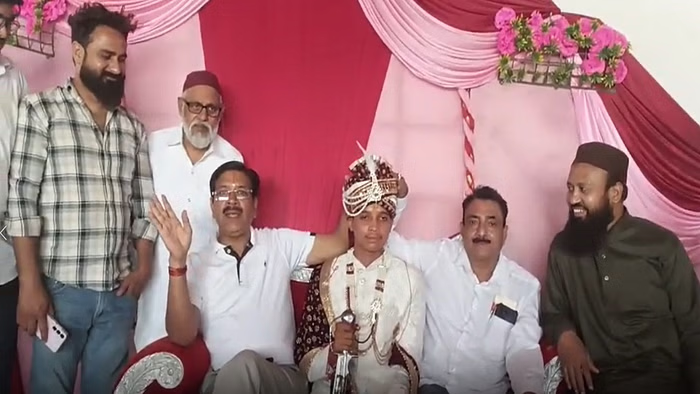
Firdaus Khan/Bijnor
Safdar Nawaz Khan, a junk dealer of Kiratpur town of Bijnore in Uttar Pradesh, recently not only arranged for the wedding of his employee’s daughter but also performed her ‘Kanyadaan’ - a Hindu wedding ritual of giving away one’s daughter to a man in marriage, considered a pious act.
The incident is being talked about as a social revolution and celebration of bonds between Hindus and Muslims of India.
It was the wedding of Rakhi, the daughter of Nawaz Khan’s longtime and trusted employee Gautam Kumar.
Performing Kanyadaan was not just a token act but a celebration of years of friendship, brotherhood, and mutual trust that made all those witnessing it emotional.
Gautam Kumar has been working at Safdar Nawaz Khan's establishment for the last 24 years.
He is an honest and hardworking person. Safdar Nawaz always considered him a part of his family, and this relationship grew so strong with the time that his children started calling him 'Bade Papa' (elder dad).
 Rakhi's groom with hee Bade Papa, Safdar Nawaz Khan (right) and Gautam Kumar (left)
Rakhi's groom with hee Bade Papa, Safdar Nawaz Khan (right) and Gautam Kumar (left)
and When Rakhi's marriage was fixed, Safdar Nawaz Khan offered to bear all the expenses of her wedding. He organized a grand event in a local banquet hall, and the guests were Hindu and Muslim.
The baraat came from Lakhimpur Kheri to a grand welcome. The baratis were impressed and some were even moved by the reception they were accorded. Showers of flowers, sweets, and above all, a union of hearts — this wedding was much more than a social function.
All the wedding rituals were performed according to traditional Hindu customs. Pandit Subhash Khanna performed the havan, and performed the sacred ritual of kanyadaan.
Everyone watching the scene of Safdar Nawaz placing Rakhi's hand in her groom’s hand – a symbolic union of the couple – felt a lump in their throats and eyes moist with emotions.
The wedding was not just a union of two individuals — it was a resonant attempt to bridge the gap between two religions, two cultures and two communities. The Muslim businessman not only contributed financially to the Hindu girl's wedding but also followed all the rituals associated with a Hindu wedding.
He not only bore the expenses of the wedding but also gave necessary items as donations and dowry. Bride Rakhi said with teary eyes, "The love, protection, and support that Bade Papa gave is rare in today's times. Today he has proved that relationships are not made by blood but by feelings."
An emotion Gautam Kumar said, "Brother Safdar proved by getting my daughter married that there is no religion greater than humanity." Many people from the city attended the wedding, including dignitaries from both Hindu and Muslim communities. Everyone described this marriage as a symbol of unity, brotherhood, and love.
Safdar Nawaz Khan said, "Rakhi is like my daughter. I have not just given her away in marriage, but have tried to give a message that we are all one. Religion does not separate people, our deeds do."
The wedding was not just a union of two individuals — it was a resonant attempt to bridge the gap between two religions, two cultures and two communities. The Muslim businessman not only contributed financially to the Hindu girl's wedding but also followed all the rituals associated with a Hindu wedding.
ALSO READ: Tribal women Iram Choudhary and Shabnam bring laurels to J&K
He not only bore the expenses of the wedding but also gave necessary items as donations and dowry. Bride Rakhi said with teary eyes, "The love, protection, and support that Bade Papa gave is rare in today's times. Today he has proved that relationships are not made by blood but by feelings."
